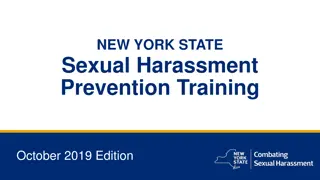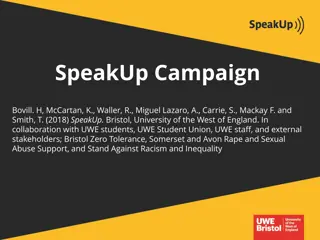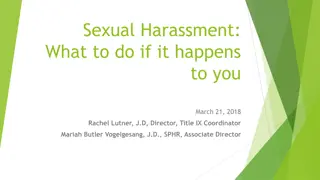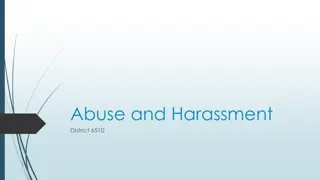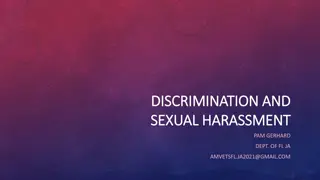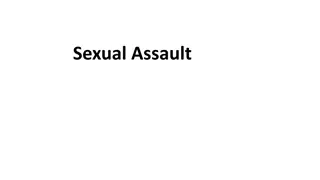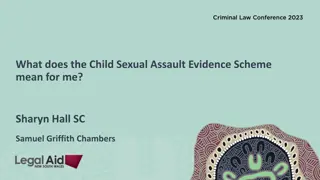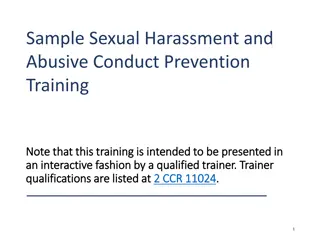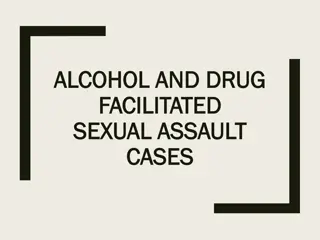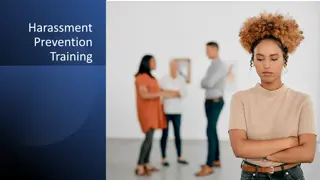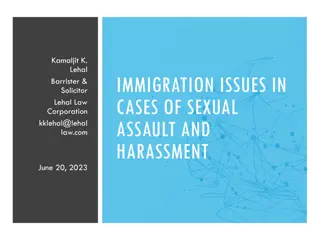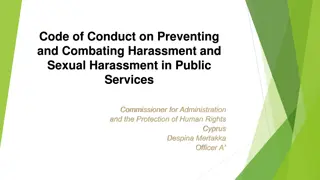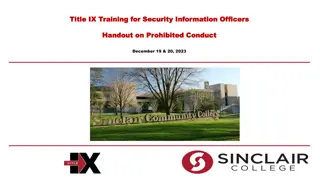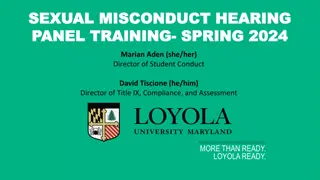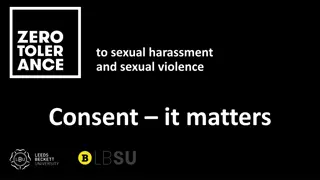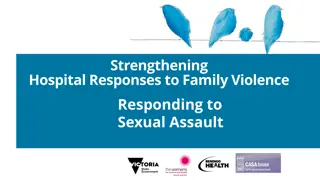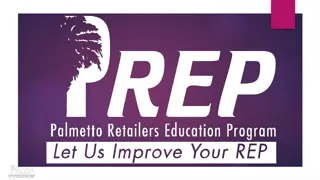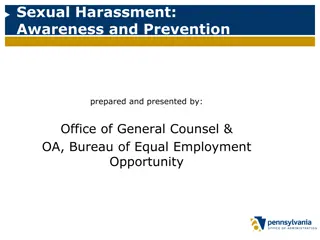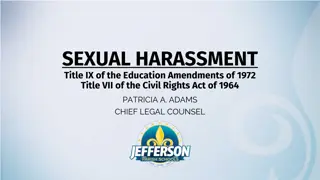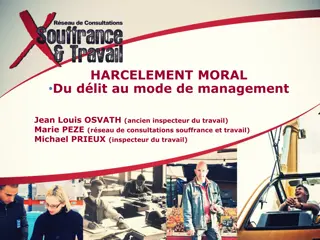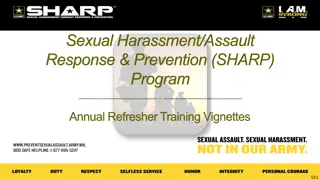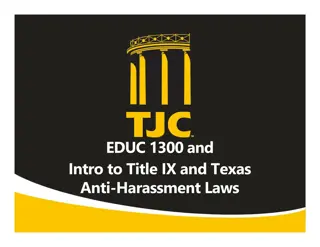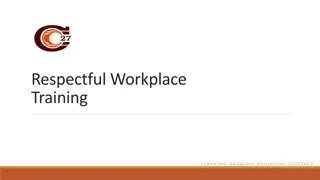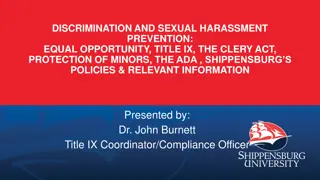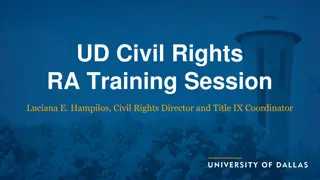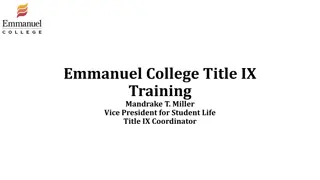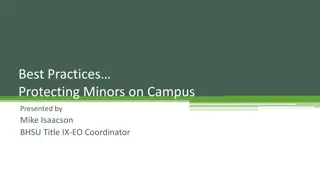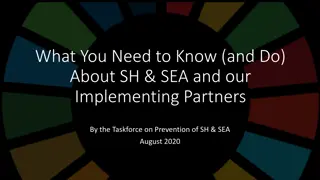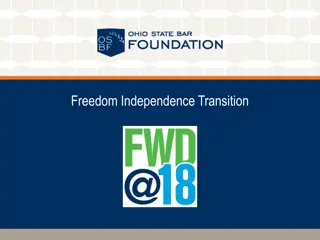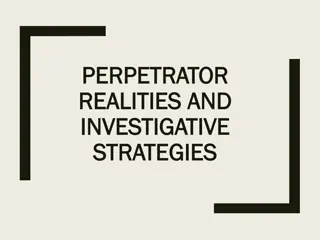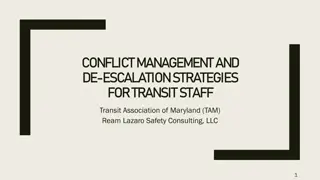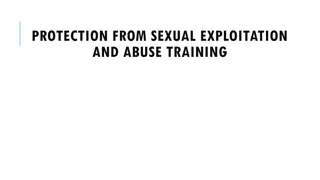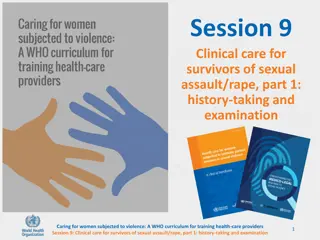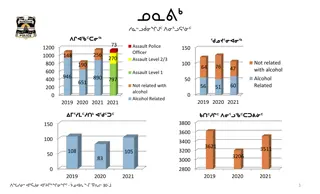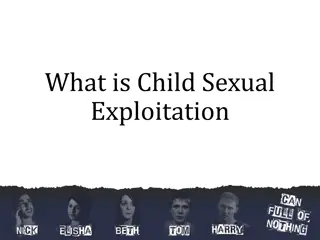Understanding and Preventing Sexual Harassment and Assault: SEAC Training Overview
SEAC provides training materials to address sexual harassment and assault within its community, highlighting the impact on individuals, organizations, and communities. The training covers definitions, categories, and the need for awareness to combat these issues effectively.
Download Presentation

Please find below an Image/Link to download the presentation.
The content on the website is provided AS IS for your information and personal use only. It may not be sold, licensed, or shared on other websites without obtaining consent from the author. Download presentation by click this link. If you encounter any issues during the download, it is possible that the publisher has removed the file from their server.
E N D
Presentation Transcript
2017 SEAC Sexual Harassment Sexual Assault Prevention Training Training materials provided by the SEAC Task Force for the Prevention of Sexual Harassment and Sexual Assault. For more information or comments on this training please email: rethridg@olemiss.edu
SEXUAL HARASSMENT AND SEXUAL ASSAULT IMPACT EVERYONE!!!!!!!!!!!!!! COMMUNITY Loss of Diversity of Perspectives Higher Rates of Violent Crime Degradation to Community Diminishes Community Relations ORGANIZATION Loss of Safety Loss of Personnel Undermines Credibility Loss of Cohesion and Teamwork Instability Disrupts Good Order And Discipline INDIVIDUAL Low Morale Self Blame Isolation Anxiety Avoidance Fear Anger Depression Less Productive Reduction in Performance Bottom Line: Sexual harassment and sexual assault endanger lives of individuals and threaten the membership of the Southeastern Archaeological Conference
Background and Need for Training In 2014, the Executive Board of the Southeastern Archaeological Conference (SEAC) proposed putting together a Task Force on Sexual Harassment and Assault in response to a survey on sexual harassment and assault conducted by an ad hoc committee from the membership. In this survey, over 60 percent of the respondents reported being sexually harassed in the field, and 12% reported assault while in the field. (For more details on the survey see the full report by Meyers et al. in the 2015 SEAC Newsletter.) This training is a first attempt at initiating awareness and prevention of the sexual harassment and sexual assault reported by the SEAC membership. Definition of Sexual Harassment Sexual harassment is a form of gender discrimination Sexual harassment includes unwelcomed sexual advances, requests for sexual favors, and other verbal or physical conduct of a sexual nature when: Submission to or rejection of is made a term or condition of a person s job, pay, career; Submission to or rejection of is used as a basis for career or employment decisions; Conduct has the purpose or effect of unreasonably interfering with an individual s work performance or creates an intimidating, hostile, or offensive work environment
Categories of Sexual Harassment Verbal Telling sexual jokes during fieldwork or in the classroom Using sexually explicit profanity or threats or sexual comments Whistling in a sexually suggestive manner Describing certain attributes of one s physical appearance in a sexual manner Using terms of endearment in referring to students, field technicians, or interns Nonverbal Staring at someone, blowing kisses, winking, or licking one s lips in a suggestive manner Displaying inappropriate printed material (e.g., sexually oriented pictures or cartoons) Using sexually oriented screen savers on one s computer Sending sexually oriented notes, letters, faxes, sexting or e-mail Physical contact Touching, patting, pinching, bumping, or grabbing Cornering or blocking a passageway Kissing Providing unsolicited back or neck rubs
Types of Sexual Harassment Quid Pro Quo/Sexual Coercion ( This for That ) Demanding sexual favors in exchange for a promotion, award, or favorable assignment Disciplining or relieving a subordinate who refuses sexual advances Threatening a poor job or academic evaluation for refusing sexual advances Hostile Environment Subjected to offensive, unwanted, and unsolicited comments or behaviors of a sexual nature. If these behaviors unreasonably interfere with an individual s performance, then the environment is classified as hostile Derogatory, gender-biased terms Sexually suggestive pictures or jokes Unwanted touching Remember, a third party not just the object of the attention can also view behaviors as sexually harassing!
Sexual Harassment Checklist Is the behavior sexual in nature? Is the behavior unwelcomed? The harasser s intent is NOT the determining factor Would a reasonable person find the behavior to be inappropriate? Apply the Reasonable Person Standard The Reasonable Person Standard includes one or more of the following: Do the elements of power, control, or influence exist? Does the behavior create a hostile or offensive environment?
Responses to Sexual Harassment Direct approach Confront the harasser and inform the person that the behavior is not appreciated or welcomed and that it must stop Focus on behavior and its impact offer behavior-centered feedback Indirect approach Address the harasser without a face-to-face conversation (e.g., send a letter or email) Third-party assistance Ask someone else to talk to the harasser, to accompany the complainant, or to intervene on behalf of the complainant to resolve the conflict Chain of command Report the behavior to your immediate supervisor or others in the chain of command and ask for assistance in resolving the situation File a formal complaint
When does sexual harassment cross the line into sexual assault? When it becomes physical! Unwanted, inappropriate physical contact such as groping or fondling constitutes sexual assault and is a crime.
SEAC Policy on Sexual Assault Sexual assault is a Criminal Offense! Members aware of an incident should report it to the authorities immediately (within 24 hours) Sexual assault is incompatible with SEAC values and is punishable under several Federal and State laws. All victims of sexual assault will be treated with fairness, dignity, and respect by SEAC. Sexual assault degrades the SEAC and the discipline of archaeology!
Legal Definition of Consent to Sexual Activity Consent will not be deemed or construed to mean the failure by the victim to offer physical resistance. Consent is not given when a person uses force, threat of force, or coercion or when the victim is asleep, incapacitated, or unconscious. A person cannot consent to sexual activity if he or she is substantially incapable due to: Mental impairment or unconsciousness resulting from consumption of alcohol, drugs, or a similar substance Mental disease or defect which renders the person unable to understand the nature of the sexual conduct at issue Physically declining participation in the sexual conduct at issue Physically communicating unwillingness to engage in the sexual conduct at issue
SCENARIO A Cultural Resources Management Fieldwork Ms. Rebecca Switzer works for a large cultural resources firm and is assigned to a cultural resources field crew in Saint Louis, MO. She is a veteran archaeological field technician with years of experience in GIS and survey. Mr. Jonathan Williams is the Field Crew Chief and Rebecca s supervisor. One evening, Johnathan asks Ms. Switzer to come to his room to download GIS files from the days field work to her laptop. While Ms. Switzer is working, Johnathan takes off his field clothes and walks around in his boxer shorts. He then walks up behind Rebecca and begins rubbing her shoulders. Rebecca says she needs to go back to her room to do some work. Williams says, If you give me what I want, I ll make sure that you are able to go home early this Friday in time for your son s birthday. Rebecca insists that she has to get back to her room. The next day, she avoids Williams and informs the company office of the incident. Nothing seems to happen to Mr. Williams. If sexually harassing behaviors appear to be described in the situation, answer yes, no, or maybe for the five questions below as they relate to the Sexual Harassment Checklist. Is the behavior sexual in nature? Is the behavior unwelcomed? Do the elements of power, control, or influence exist? Does the behavior create a hostile or offensive environment? Would a reasonable person find behavior to be inappropriate?
SCENARIO B First Year Graduate Assistantship Ms. Leslie Robinson, a first year graduate student, works in a graduate office environment. One day, Bill Evans who is a 4th year lab supervisor (not a student) stopped by fellow graduate student Mark Smiths cubicle to talk loudly about Ms. Robinson. Evans told Smith that he would like to take Ms. Robinson home and let her teach him a few things. Ms. Robinson did not hear any of it, but two other first year graduate students, John Weaver and Tina Michaels, did. John observed that Tina was uncomfortable with the conversation. Later in the day, Evans and Smith passed Tina and John in the break room, after which Tina confided in John that she does not want to work with Evans nor Smith. She says that was not the first sexist remark she has heard from Evans, and she doesn t want to work with him if that s how he is going to talk about women. Tina also mentioned that she was going to tell Ms. Robinson about the remarks when she returned to the graduate offices in the morning. The next morning, Tina tells Ms. Robinson about Evans comments. Ms. Robinson becomes very angry and wants to file a complaint with her professor, however she is worried that this could impact future assistantship opportunities working in the lab. If sexually harassing behaviors appear to be described in the situation, answer yes, no, or maybe for the five questions below as they relate to the Sexual Harassment Checklist. Is the behavior sexual in nature? Is the behavior unwelcomed? Do the elements of power, control, or influence exist? Does the behavior create a hostile or offensive environment? Would a reasonable person find the behavior to be inappropriate?
SCENARIO C Field School in August Mr. Ron Goodlad, a Junior undergraduate student, is working at his first archaeological field school. The crew consists mostly of women and is located in one of the hottest parts of the Delta. One day, Ron removes his shirt to apply some sun screen. Fellow student Ms. Amber Sanders offers to apply sunscreen to Ron s neck and shoulders to prevent sunburn. As Amber helps Ron apply sunscreen, several other students begin whistling and making lewd comments. Later that evening, the field crew goes out for dinner and drinks. After the crew has a few brews at the local bar, a few of the female crewmembers decide it would be funny to remove Ron s shirt to check for sunburn. After several failed attempts, Ron leaves the group to return to camp. Amber remains behind and the group s attention shifts to her. This continues over the course of the field school causing tensions between Ron and Amber. Additionally, Ron is so embarrassed by this type of attention he drops out of the field school altogether. If sexually harassing behaviors appear to be described in the situation, answer yes, no, or maybe for the five questions below as they relate to the Sexual Harassment Checklist. Is the behavior sexual in nature? Is the behavior unwelcomed? Do the elements of power, control, or influence exist? Does the behavior create a hostile or offensive environment? Would a reasonable person find the behavior to be inappropriate?
AWARENESS AND PREVENTION If you are witness to Sexual Harassment and/or instances of Sexual Assault, DO NOT BE SILENT. As a bystander, you can help build a culture of accountability and prevention. Sexual Harassment Sexual Assault Sexual Innuendo Sexual assault Mutually consenting/safe Mutually flirtatious/playful Inappropriate or non-mutual Sexual harassment Bystander Intervention Opportunities
Bystander Intervention Process Notice the event along a continuum of behaviors Interpret the event or behavior as a problem Feel responsible for solving the problem Choose how to intervene BUILD THE CULTURE OF PREVENTION
Bystander Intervention Techniques Do something Change subject matter Distract the offender Remove victim from hostile environment Cause an interruption Serve as an ally to the victim Call for help Be a part of the solution, not a part of the problem
SEAC Leadership and Membership Responsibilities for Prevention SEAC will strive to: Lead by example Establish a climate of prevention Post written sexual assault and sexual harassment policy letters and victim services information at member institutions
Additional Resources Your State and City May Have Additional Resources National Sexual Assault Hotline: 1-800-656-HOPE 9 to 5: National Association of Working Women: 1-800-522-0925 Equal Employment Opportunity Commission: 1-800-669-4000 Equal Rights Advocates: 24 hr line: 415-621-0505 National Center for Victims of Crime: 202-467-8700 National Women's Law Center: 202-588-5180 U.S. Department of Labor Women's Bureau: 1-800-827-5335 Rape Abuse & Incest National Network (ALL STATES): 800-656-4673 Alabama Coalition Against Rape: 334-264-0123 Florida Council Against Sexual Violence: 888-956-7273 Grady Rape Crisis Center: 404-616-4861 North Carolina Coalition Against Sexual Assault: 888-737-2272 South Carolina Coalition Against Sexual Assault: 803-256-2900
Training Summary In this training, we described the impact of sexual harassment and sexual assault on the SEAC membership, discussed support resources available to complainants of sexual harassment and victims of sexual assault, penalties for sexual harassment and sexual assault offenders, and promote awareness of the SEAC Sexual Harassment and Sexual Assault Prevention Program. As members you can help make a difference in creating a culture of prevention!




